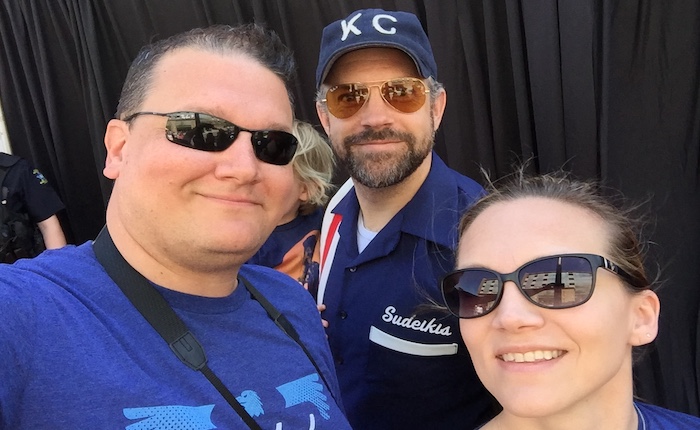Some of the pandemic’s most relevant and resonant lessons about leadership didn’t come from a high-profile CEO’s LinkedIn post. Instead, the master-level class on what it takes to be a leader was taught by a folksy, optimistic, positive – and entirely fictional – soccer coach. And his sweet mustache.
Ted Lasso, perfectly embodied by Jason Sudeikis in the eponymous Apple TV+ series, crammed more nuggets of wisdom in the five hours of the show’s first season (the second season drops July 23) than in a library of well-meaning business books. Most of them are homespun bon mots: “You know what the happiest animal on Earth is?” Ted asks a team member struggling with letting go of an issue. “It’s a goldfish. You know why? Got a 10-second memory. Be a goldfish.”
In what could have been a ham-handed fish-out-of-water story, with much of the humor aimed at Lasso’s seemingly Pollyanna-ish approach. (“For me, success is not about the wins and losses,” he says. “It’s about helping these young fellas be the best versions of themselves on and off the field.”) “Ted Lasso” instead turns our expectations on their ears and demonstrates how a sincere, transparent leader can affect change in the people he or she leads – even while dealing with his own crumbling marriage and debilitating panic attacks. It’s an even stronger left turn since Lasso was initially set up to fail. New team owner Rebecca hired Ted to spite her ex-husband and drive the team, which she got in the divorce, into the ground. Before he arrived in the UK, Ted was a successful college football coach in Kansas, and had never coached soccer before.
Because of the optimism and feel-good approach, the show was awarded a Peabody earlier this summer “for offering the perfect counter to the enduring prevalence of toxic masculinity, both on-screen and off, in a moment when the nation truly needs inspiring models of kindness.”
Ted’s lessons are legion; here are a few that anybody in a leadership role can apply to their own situation:
Connect with your team. Minutes after his arrival, Ted startles kit-man Nathan by asking his name. “No one ever asks my name,” says the surprised assistant. By building a relationship with “Nate the Great” (who gets a well-deserved promotion by the 10th episode), not to mention every other person on the team – as well as some of their friends and family – Lasso empowers them all to become authentic ambassadors for his approach. “Indeed, much of the personal transformations in the characters and their extended relationships occurs through the ripple effect of Ted’s radiant optimism and intensely sincere, if folksy, good will,” cited the Peabody Board of Jurors. Every single person in Ted’s orbit feels seen and heard, a hallmark of true leadership.
Rely on others. Ted demonstrates early and often that he values and relies upon other people’s perspectives. Coach Beard, his second in command, expertly plays the role of integrator to Lasso’s visionary, and the duo is greater than the sum of their parts. Ted constantly brings others into the conversation, both to hear diverse points of view, but also to keep them engaged with what’s happening across the team. When aging star Roy comes to Ted for advice, the coach pulls together a brain trust of Coach Beard, Nate and Higgins, which he brands the “Diamond Dogs.”
Be consistent. One of the major arcs of the season is how Ted keeps trying to get superstar jerk Jamie to pass the ball to his teammates rather than hogging all the goals himself. When Jamie finally learns the lesson, it’s (spoiler alert) when he gets called back to the Manchester City team, and his finally unselfish move results in the goal that beats Ted’s team, AFC Richmond. Ted sends Jamie a heartfelt letter saying how proud he is of him making the extra pass to his teammate, which clearly impacted Jamie (who we’ll no doubt see rejoin the team next season). Ted had an approach, and he stuck with it.
One of the first things Ted does when he arrives is to scribble a sign that says “BELIEVE” and slap it on the wall, hearkening back to it multiple times as the season wears on. “I believe in hope,” he says. “I believe in ‘Believe.’” The team initially shakes their head at this rube from America, but ultimately his consistent and collaborative philosophy – and what the Peabody Awards call his “charming dose of radical optimism” – resonates. His inherent honesty, communications skills and intentional approach to build a community designed to strengthen the team moves the ball up the pitch, both literally and figuratively.

